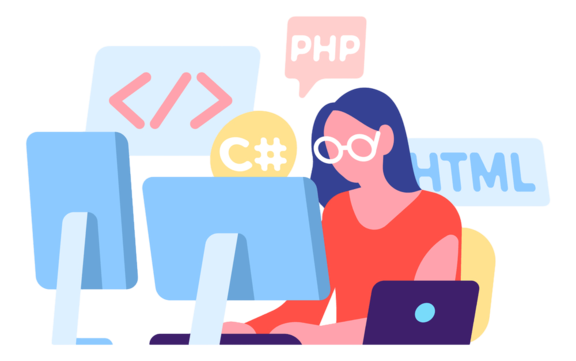Starting your journey in software development can be pretty overwhelming. There’s so much info out there, and it can feel like an endless book, the more you dig in, the more there is to learn. It can seem like your to-do list just keeps getting longer.
Whether you want to develop software, build websites, create apps, or simply understand the technology, learning to code is a valuable investment and knowing what path to follow can make things easier for you. Here’s a guide to help you get started on your programming journey.
Understand the Basics
Knowing the basics helps developers make informed decisions, optimize code performance, and troubleshoot issues effectively.
- Variables: Storing data values.
- Data Types: Different kinds of data (e.g., integers, strings, lists).
- Control Structures: Making decisions in your code (e.g., if-else statements, loops).
- Functions: Reusable blocks of code that perform specific tasks.
- Object-Oriented Programming: Organizing code into objects
Choose the Right Language
Focus on one language and once you are ready, proceed to the next one, you’ll be already familiar with key concepts. There are a lot of similarities between the languages, just different syntaxes most of the time. To pick one, you have to know that each has its strengths and use cases.
Here are a few beginner-friendly options:
- Python: Great for beginners due to its simple syntax. It’s versatile and widely used in web development, data science, automation, and more.
- JavaScript: Essential for web development. If you’re interested in building websites or web applications, JavaScript is a must.
- Ruby: Known for its simplicity and readability, Ruby is an excellent choice for beginners and is often used in web development with the Ruby on Rails framework.
- Java/C#: A bit more complex but highly in-demand, especially in enterprise environments. It’s a good choice if you’re interested in Android app development or large-scale systems.
Get familiar with Data Structures & Algorithms
Data structures form the backbone of how data is stored and manipulated, while algorithms provide efficient methods for processing that data. By grasping the fundamentals, you will have these skills:
- Efficiency: Efficient algorithms and data structures can significantly improve the performance of your applications. They help you write code that runs faster and uses less memory.
- Problem-Solving: Many interview questions for software engineering positions involve data structures and algorithms. Understanding them well can help you perform better in technical interviews.
- Commonality: Data structures and algorithms are used everywhere in software development, from building databases to creating user interfaces. They provide the foundation for many programming paradigms.
- Optimization: Choosing the right data structure or algorithm can make the difference between an application that works and one that is blazing fast.
Development Environment
Master your dev tools can streamline your workflow, boost productivity, and enhance your overall coding experience. Whether you’re using code editors like Visual Studio Code or JetBrains IDEs, version control systems like Git and GitHub, or package managers like NPM and yarn, becoming proficient with these tools allows you to work more efficiently and collaborate seamlessly with others.
Understanding their advanced features, shortcuts, and integrations can save you significant time and effort, making you a more effective and confident developer.
Focus on mastering the basics and gradually build up your skills. As you gain experience, you’ll find that you can learn what you need as you go along.
– Ale R.
Also, I recommend look into roadmaps for more information, this site will help you a lot for study

